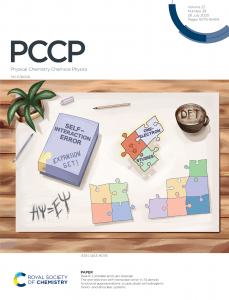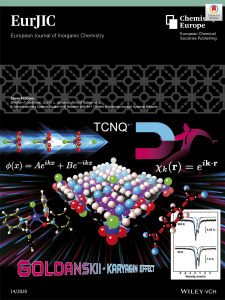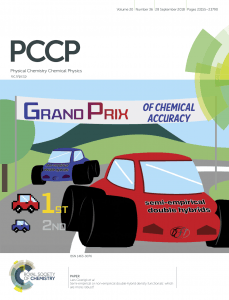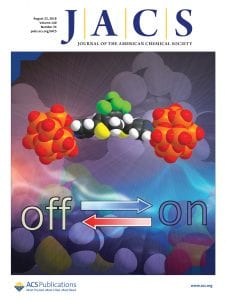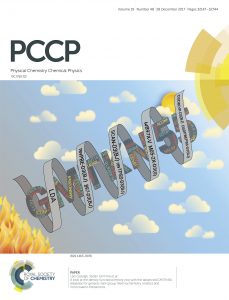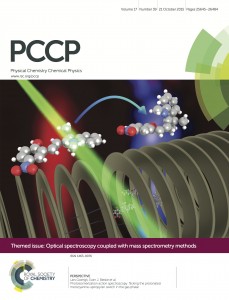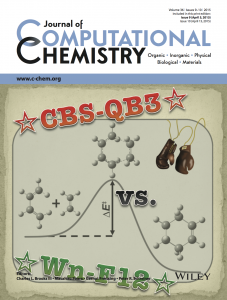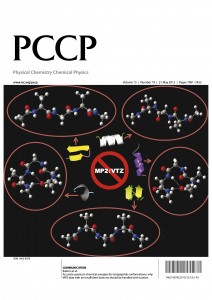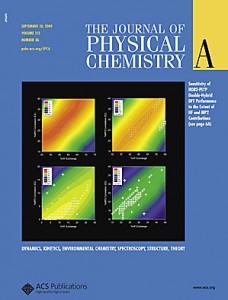About Our Research
Research Topics Cover Articles Research Collaborations Research Funding
Research Topics
- Development of new quantum-chemical methods for electronic ground and excited states, in particular in the field of Density Functional Theory (e.g. double-hybrid density functionals). Currently, we focus on developing improved and more efficient time-dependent double-hybrids for excited states and we published the currently most accurate and robust TD-DFT methods for singlet-singlet and singlet-triplet excitations in organic molecules.
- Understanding the role of London-dispersion effects (van-der-Waals forces) in noncovalently bound systems and in general thermochemical problems, incl. the accurate treatment of these forces with time-efficient methods.
- The efficient treatment of electronic excited states (organic dyes, singlet-fission materials, organic luminescent solar concentrators), incl. theoretical electronic circular dichroism spectroscopy
- The development of thermochemical benchmarks to evaluate quantum-chemical methods: the GMTKN24, GMTKN30, and GMTKN55 databases. GMTKN55 allowed us to carry out one of the largest DFT assessment studies. We also aim at closing the gap between the user community and us developers and provide advice on which methods to use, which to avoid, and which misconceptions in the field to be aware of.
- The efficient quantum-chemical treatment of biomolecular systems and quantum-refinement of biomolecular X-ray structures.
- General Computational Chemistry (Organic and Inorganic Chemistry) for applications, such as photovoltaics, fluorescent molecules, molecular switches.
Cover Articles (and cover features)
Research Collaborations
Research collaborations (past and present) with experimental and theoretical groups:
- at the local level: Prof. Colette Boskovic, Prof. Brendan Abrahams, Prof. Spencer Williams, Prof. Jonathan White, Prof. Richard O’Hair, Prof. Uta Wille, A/Prof. Wallace Wong, A/Prof. David Jones, Prof. Evan Bieske
- at the national level: Dr Chris Ritchie (Monash University), Prof. Amir Karton (The University of New England), Prof. Leo Radom (The University of Sydney), Dr Sebastian Furness (The University of Queensland)
- at the international level: Dr Christof Jaeger (University of Nottingham, UK) Prof. Tobias Schwabe (University of Hamburg, Germany), Prof Guochun Yang (Northeast Normal University, China), Asst. Prof. Bun Chan (Nagasaki University, Japan), Prof. Stefan Grimme (Mulliken Center for Theoretical Chemistry, University of Bonn, Germany), Prof. Jeffrey R. Reimers (International Center of Quantum and Molecular Structure, Shanghai University, China), Dr Holger Kruse (Institute of Biophysics, Brno, Czech Republic), Prof. Thomas Jagau (KU Leuven, Belgium)
Research Funding
We gratefully acknowledge present and past financial support, as well as support in the form of computational resources from the following organisations:
- The Australian Research Council (ARC): Discovery Early Career Research Award 2014 (DE140100550), Discovery Projects (DP180101413, DP230102664)
- The University of Melbourne: Faculty of Science Research Grant Support Scheme 2016; Dean of Science’s Engagement Seed Funding 2015; access to high-performance computing clusters
- Group of Eight Australia and German Academic Exchange Service: Go8 Australia-Germany Joint Research Co-operation Scheme 2015/2016
- Selby Scientific Foundation: Selby Research Award 2014
- German National Acadademy of Sciences “Leopoldina“: Postdoctoral Research Fellowship 2012-2014
- National Computational Merit Allocation Scheme and the National Computational Infrastructure (NCI) National Facility (Canberra)
- Melbourne Bioinformatics (formerly known as VLSCI)
